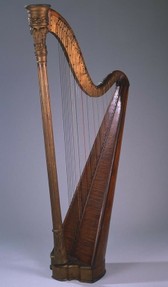 There's Welsh blood, I'm biased. But even so there is something about the national anthem of Wales that must grab everyone by the solar plexus and run.
There's Welsh blood, I'm biased. But even so there is something about the national anthem of Wales that must grab everyone by the solar plexus and run.
It's a song of defiance; a rebel yell which flashes two fingers at all who tried to destroy them. While so many anthems are aggressive - the US one would read the same, if you just swapped the lyrics to 'we hate the British'; while the English one is mostly about killing Scots - Land of my Fathers yells 'come and get me, if you can'.
And I was quite deliberate in mentioning the whole hand gesture there. That's Welsh. Medieval longbow archers, captured in battle, would have their two fingers cut off. It stopped them ever being able to draw back another bow. The Welsh lined up to intimidate their opposition by demonstrating that they could still release a deadly volley of arrows. They showed their two fingers to the enemy.
The whole of Welsh history is a study in self-defense and fighting back in order not to be obliterated. That a national anthem exists at all must be viewed as something of a miracle. As it does, it's little wonder that the whole ethos of it is one of exultant pride, tinged with relief, echoing the very Welsh sentiment of 'yma o hyd' - We're still here.
The muse has eluded the traitors' foul knives, The harp of my country survives.
In translation, those are the last two lines of the last verse, before the uplifting, screaming 'Nation! Nation! True am I to my country!' It's the part that always gets me.
Of course, any translation is going to be indistinct. I've heard it rendered, The spirit wasn't hindered by the awful, treacherous hand, Nor the sweet harp of my country, or the part about the harp substituted for the language of my country goes on.
They're all right. Words and sentiments are intertwined in the lyrics, 'Ni luddiwyd yr awen gan erchyll law brad, Na thelyn berseiniol fy ngwlad.' It means all of those things.
This was a land and people founded upon the bardic traditions. The harp wasn't just a musical instrument. It told the histories, genealogies and legendary tales; it touched spirituality and knowledge; it reported the current news and found precedents in the past; it encapsulated a whole culture. At least it did, in the right hands.
Language is important. National self-identity can only exist where there is a shared, common language. Other tongues may enter to enrich it, but the invaders have only won out, when the lexicon of the subdued is finally dead.
But language is more than just words. It's in the non-verbal communication and the unspoken understanding too. Old friends or close family wouldn't need to even look at each other to know what is being thought. Experience and personal history tell them enough. Thus it can be with nations too.
The bardic harp of Wales is its language. No matter what was thrown at the country and its people, the awen, the spirit, the muse, the cultural inheritance, the spiritual life and inspiration goes on. No invader managed to kill what it fundamentally meant to be Welsh. Yma o hyd.
So indulge me. If you've never heard this anthem before, then hear it first in the original Welsh; because, in so many ways, that is the point. If having a national anthem was a miracle, then the fact that it was written in the native tongue is something beyond that. Any gambler would say that it shouldn't exist at all, and if it did, then it has to have been in English by now. It's not - The harp of my country survives.


 There's Welsh blood, I'm biased. But even so there is something about the national anthem of Wales that must grab everyone by the solar plexus and run.
There's Welsh blood, I'm biased. But even so there is something about the national anthem of Wales that must grab everyone by the solar plexus and run.
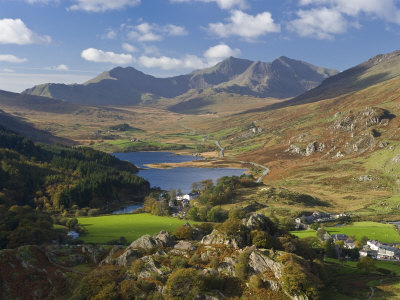
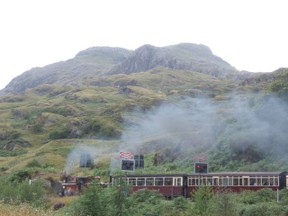 It's difficult to pinpoint any moment in the history of the past millennium when Wales hasn't been bitterly defending itself against English interests. Therefore it should come as no surprise that this period was one of them.
It's difficult to pinpoint any moment in the history of the past millennium when Wales hasn't been bitterly defending itself against English interests. Therefore it should come as no surprise that this period was one of them.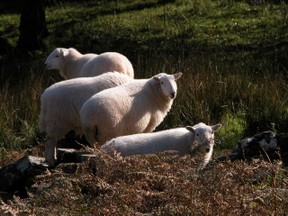 In the 1850s, there were no cars, but the railway lines did pretty much the same thing. This was the great age of steam engines, where produce could be efficiently delivered to distant markets on the same day.
In the 1850s, there were no cars, but the railway lines did pretty much the same thing. This was the great age of steam engines, where produce could be efficiently delivered to distant markets on the same day.


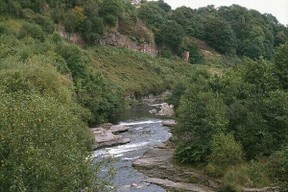 It was against this back-drop that two weavers in Pontypridd, South Wales, came up with their song. Evan James had lost two brothers to the emigration ships.
It was against this back-drop that two weavers in Pontypridd, South Wales, came up with their song. Evan James had lost two brothers to the emigration ships.









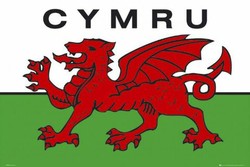

 St Tydecho's Churches in West Waleson 09/03/2014
St Tydecho's Churches in West Waleson 09/03/2014
 Goodies for an Outlander Premiere Partyon 03/06/2015
Goodies for an Outlander Premiere Partyon 03/06/2015
 Holocaust Memorial Day Interview with Rainer Höss, Grandson of Rudolf Architect of Auschwitzon 01/24/2015
Holocaust Memorial Day Interview with Rainer Höss, Grandson of Rudolf Architect of Auschwitzon 01/24/2015
 Romantic Valentine Gifts for an Outlander Fanon 01/16/2015
Romantic Valentine Gifts for an Outlander Fanon 01/16/2015


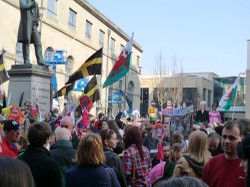
Comments
We'll be glad to have you here; and I'm confident that you'll enjoy it. You often see Dr Who being filmed in Cardiff, so you have a chance of catching that too.
Thank you for learning a bit of Welsh. it will be appreciated, even though everyone speaks English there. Shout up if I can help with some basic words and phrases.
Diolch! <3
As a fellow welsh girl who can also siarad gymraeg, this is a great page!
Oh nice one, Lissie! I didn't realise that the Eisteddfodau happened as much in New South Wales, as in the old one. No, the Eisteddfod is very Welsh.
We're talking a similar time-frame to the Highland Clearances, for much of the same reasons.
Eisteddfod are alive and well in Australia - that was where I cam across them - I must admit I thought that they came from Ireland - given the number of Irish immigrants that came to Oz in the 19th century.
It sounds like a similar story to the Scottish clearances - but sounds like people left "voluntarily" rather than by being removed force-ably by the landowners.